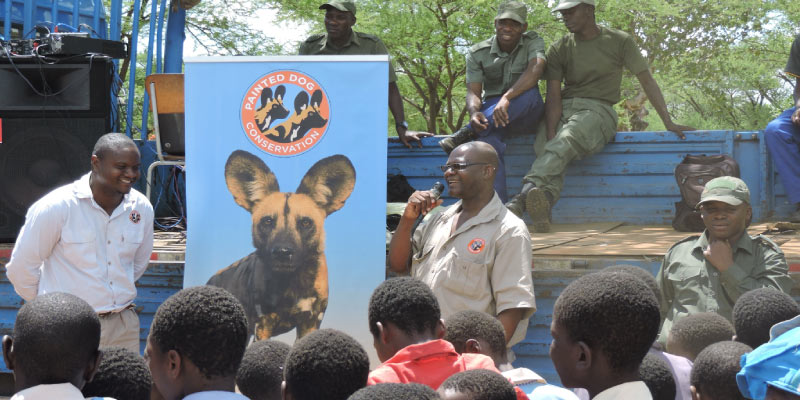
David Kuvawoga has held a deep connection to the environment since birth. Growing up in a rural village in Chirumanzu, Zimbabwe, he was surrounded by vast grasslands, rolling mountains, and a horizon full of fresh air. “When I was young, I just wanted to be outside,” Kuvawoga says. This early love of nature is what eventually led him to the Nelson Institute, where he is currently earning his master’s degree in environmental conservation.
Kuvawoga was also surrounded by a family that cared deeply about the environment — his older brother went into conservation, and his father worked for Zimbabwe’s national parks. To Kuvawoga, “I had people ahead of me who paved the way for me and brought home the passion for environmental conservation. It’s what we lived and breathed, so my own passion developed early on.”
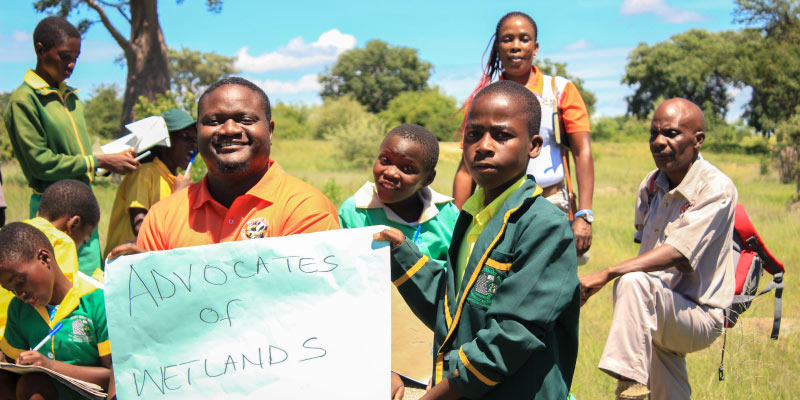
As Kuvawoga grew older, he began to take an interest in his dad’s work as a national park ranger. “I was so into it that one day I put on his uniform — which was too big for me — sat in his office and imitated him. It was almost like a premonition as to what direction in life I wanted to take,” says Kuvawoga. “I was so inspired by not only the work my dad was doing, but also the people he interacted with, the family that the national parks created, and the protection the parks brought to the wildlife.”
Though his brother and father had somewhat “paved the way” for Kuvawoga’s career in environmental conservation, he still feels like the decision was his own. “I embraced the idea that you could be one with the environment,” he says. He had a passion for learning about the natural world and was constantly questioning the role humans play in the environment. “I was asking myself questions that I was too young to be asking,” says Kuvawoga, “but I was asking them because I had a desire to know the answers — and I knew I could find those answers through studying conservation.”
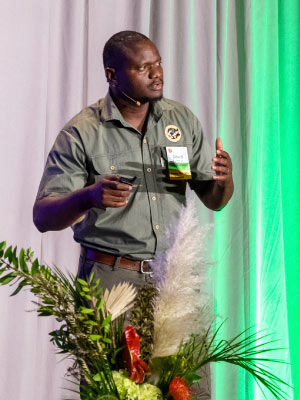
Kuvawoga started with a bachelor’s degree in nature conservation, graduating in 2010 from Tshwane University of Technology in South Africa.“My education was quite encompassing, and it [made me] someone who could lead teams and operations in conservation,” Kuvawoga says. After graduating, he worked as an assistant estate manager near Johannesburg, South Africa, but began to miss his home country. “I wanted to have a greater impact as a professional and home was the best place to begin.”
In 2015, Kuvawoga returned to Zimbabwe just in time to become an operations manager for Painted Dog Conservation (PDC), an organization that works with government agencies and communities to raise awareness for the endangered African wild dog, also known as the painted dog. Right now, there are fewer than 7,000 painted dogs left — but Kuvawoga and his team are developing strategies around the clock to raise that number.
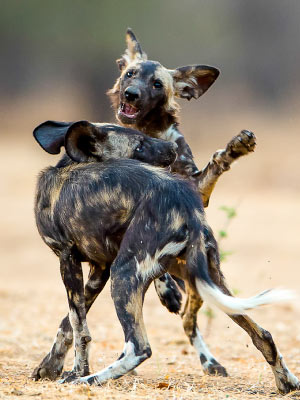
One way PDC helps raise awareness about the species is educating local youth about the threats that African wild dogs face. “Their relationship with wildlife is somewhat bitter,” Kuvawoga says. “They’ve only seen lions or elephants when they’re coming to kill their family’s cattle or eating the last of their crops.” Since 2004, PDC has brought more than 16,000 kids from local primary schools to Hwange National Park, where the organization’s work is based.
Introducing younger generations to Hwange, its wildlife, and the basic principles of environmental conservation has sparked a generational shift, with many locals growing to appreciate the painted dogs and their role in the ecosystem. In 2015, local communities even started to volunteer their own anti-poaching units to help PDC remove wire snare traps that often snagged painted dogs as bycatch.
However, Kuvawoga has learned that these attitude shifts don’t happen overnight. “It takes time for behavior to change when we’re working with communities,” Kuvawoga says. “It’s something that shows us that conservation is not a sprint, it’s a marathon. But we still need to be out there, doing our best every day and hoping that, one day, we can experience those life-changing moments when people and wildlife are reconnected again.”
While working at Painted Dog Conservation Kuvawoga felt himself wanting to understand conservation on a broader scale, leading him to the Nelson Institute’s environmental conservation program. He first heard about the Nelson Institute in 2017, when Arlyne Johnson, a Nelson Institute lecturer, was visiting Zimbabwe as a strategic planning expert with the Foundations of Success. To Kuvawoga, “I knew that when I was ready to go back to school, it had to be at one of the best institutions I could find — and everything I heard about the Nelson Institute made it obvious to me that this is the place I was going to go.”
Kuvawoga decided that he was ready to enter back into academia earlier this year, and is now a first year master’s student in the Nelson Institute’s environmental conservation program. “The instructors are the best out there. They’re widening my horizon from many different perspectives — like conservation planning, leadership, policy, human wildlife conflict, climate change, communication, and more, Kuvawoga says. “I am a changed person now. My attention to detail and planning skills have improved, my resource base is wider, and I feel like I can take on the world.”
Within his studies, Kuvawoga is particularly passionate about investigating how humans interact with wildlife, and how those interactions can often be invasive or inconsiderate of animal welfare. He says, “sustainable conservation should make enforceable policies that safeguard wildlife in the long-term. We can’t turn a blind eye; we have to speak out for animals.”
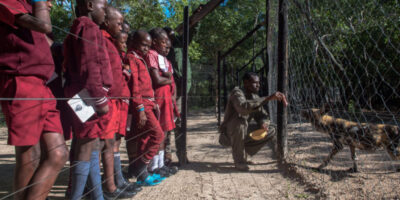
After graduation, Kuvawoga plans on returning to Zimbabwe to continue speaking out for its wildlife. “I’ve been with Painted Dog Conservation for 10 years now, and the vision hasn’t been fulfilled yet. We have a job to do,” he says. Upon his return to the organization, Kuvawoga, who is now PDC’s operations director, aims to not only protect the painted dogs, but also dozens of other species across Africa that face threats from a changing environment. The best way to do this, he says, is through collaboration.
“Environmental conservation isn’t a sprint, it’s a marathon,” Kuvawoga reiterates. “But even as a marathon, it’s more of a relay-marathon.” When it comes to solving environmental issues, it takes an entire team of people working diligently over time to see change. “The world’s environmental problems are many and diverse, and you can’t deal with them alone. You need to have partnerships, you need to collaborate, and you need to have a multidisciplinary approach to the environmental challenges that the world is facing. We’re all in this together.”